I will be talking a lot about the Apple TV show Severance in this post, including spoilers for season 2! If you haven’t watched yet and don’t want to be spoiled, skip this one. Otherwise, welcome to the calamitous ORTBO.
I have not polled the subscribers of my Substack to get a sense of how many of you share my current deep focus on Severance, but I know there are at least a few of you who have joined me in the rabbit hole. This show has been special to me in a way that I have not experienced since I watched Lost weekly for years in middle and high school. Not only do I love the show and want to talk about it a lot and reflect on it, but so do a lot of people I know. Shared media obsession events like this are increasingly rare in a splintered streaming world! This experience has been a delight and has carved out a loving sanctuary for Ben Stiller in my heart. Even more special to me is how this show has created opportunities for me to have in depth, unflinching discussions with friends and colleagues about worker’s rights, trauma, grief, autonomy and what it means to be a person.
If you have not watched the show, it is set in an ambiguous company town that has been built up around a corporation called Lumon. What Lumon does (manufacturing? services? research?) is unclear, but we are introduced to a small group of workers who have been “severed,” a procedure that creates a split consciousness within a single person. The severed workers, referred to as “innies,” are only conscious when their body takes the elevator down to the “severed” floor of Lumon. When they clock out for the day, we see their “outie” come back online and resume their lives outside of work.
The very beginning of the show introduces a new innie to the severed floor. When innies “wake up” on the severed floor for the first time, they have no personal memories and a limited understanding of how the world outside of Lumon functions. Their development is entirely shaped by the strange experiences they have as severed floor workers, tasked with banal, seemingly endless point-and-click work called “macrodata refinement” that is occasionally punctuated by batshit overstimulating experiences ranging from dance parties to Eyes Wide Shut-esque orgies. We watch the innies search for meaning, find connection with other departments, forge friendships, fall in love, get into conflict with their leadership, and dream about what life may be like outside of the severed floor. They are sometimes told facts about their outies in a parody of corporate wellness measures but it is made very clear that the innies are autonomous people with separate personhoods from the outies that share their body.
The main outie storyline we follow is that of Mark Scout, a former history professor who chose to undergo the severance procedure after losing his wife, Gemma, in a car crash. It is obvious that Mark made the decision to undergo severance believing it would give part of himself a break from the grief of losing his wife, but the consequences of his choices continue to unfold as season two progresses. It becomes clear as the show goes on that most outies see the innies as a way to meet their own needs rather than whole, separate people, while the innies mightily disagree. In season one, Helena (the outie of Helly R.) sends a video message after Helly R. submits an unsuccessful resignation request stating “I am a person; you are not.” In response, Helly R. attempts suicide in the severance elevator in an effort to murder her outie and permanently end her own existence rather than be under the thumb of her oppressive outie.
The tension of innies and outies existing within the same body continues to surface throughout the show and creates the central conflict that culminates in the finale. Outie Mark has discovered that his wife Gemma is still alive on a lower floor of Lumon and attempts to enlist innie Mark’s help in rescuing her. The exchange begins sweetly—innie Mark is obviously excited to get the opportunity to speak to his outie, and is genuinely touched by the apology that outie Mark gives for creating him in the first place. Innie Mark explains that his existence on the severed floor is not a nightmare the way that outie Mark believes it is—”we find ways to make things work,” says innie Mark, and explains that the innies just want to be given space to live their own lives on their own terms. The tone of the conversation shifts as innie Mark slowly realizes that outie Mark has only contacted him to ask him for help in rescuing Gemma and making the ultimate sacrifice—innie death—so that outie Mark can return to his life with his previously presumed dead wife. Outie Mark tries to reassure him that he has started a process called reintegration in order to join their two consciousness together, but innie Mark has understandable concerns. Outie Mark has 20x as many memories and experiences as innie Mark, so does that mean that innie Mark will be only a tiny sliver of the total Mark existence? Outie Mark cannot answer these questions, obviously, and in a moment of frustration and desperation to rescue Gemma, he asks innie Mark “Can you just trust me?” Innie Mark pauses for a moment, then responds definitively: “no.”
There is truly so much to unpack about this episode, but I am going to focus on the final scene, when innie and outie Mark have successfully rescued Gemma from the Lumon basement and innie Mark has pushed Gemma through a stairwell so that she can escape. On the other side of the door, Gemma as her outie self shouts at innie Mark to come through the door and become outie Mark so that the two can run away and resume their lives together. Innie Mark hesitates, knowing that once he goes through that door he will likely never wake up again, effectively ending his life. Then, Helly R., who he has fallen in love with over the course of this season, appears behind him. Gemma becomes increasingly panicked, yelling Mark’s name, as she sees innie Mark slowly slip away and ultimately choose to join Helly in running through the halls of Lumon, ostensibly to find somewhere to hide and live their lives together on the severed floor.
As you might imagine, this has made innie Mark into a quasi-villain to many people. Outie Mark and Gemma’s love story is so compelling, traumatic and heartbreaking that I truly do understand this reaction. Watching Gemma pound on the glass screaming in anguish after a brief moment of elation that she had escaped torture and would be reunited with her husband was devastating. We know the suffering outie Mark went through grieving the death of his wife, then the suffering he felt knowing she was trapped at Lumon, and it seems that Gemma will be doomed to experience the same thing (at least for a period of time). What is interesting to me though is the justification given for anger at innie Mark. “What kind of life can they have together at Lumon trapped inside the building of their oppressors? That’s not a life,” one comment on TikTok read. “Outie Mark has so much more to live for and his relationship with Gemma is so much more developed—they have history,” read another. Many people who are mad at innie Mark cite their belief that he is not a person, that he is an unethical creation that is better off disappearing into oblivion. I think these questions and reactions get at a much bigger question—what is a life worth living?
Helly R.’s lines from the finale get at this question better than anything I can think to say. When she is saying her veiled goodbyes to innie Mark as he completes the Cold Harbor file, she shares some of the place names she has been trying to remember. “Europe…Zimbabwe…the Equator,” she lists, half giggling. “The Equator? What’s that, a building?” innie Mark jokes. “Maybe,” says Helly R., “maybe it’s a building so big that it became a continent.”
Ultimately, that’s what Lumon is to the innies, a building that grew so large it could house an entire life’s worth of memories, relationships, heartbreaks and adventures. For many of the children and families I support, their Equator is the hospital. They live for weeks, months, sometimes years at a time in the hospital, sometimes with only short stretches at home in between. When they do go home, they often rely on feeding tubes, ventilators, cough assist devices, suction, oxygen, medications, therapies, etc. to stay as alive as long as possible. Over time, I begin to hear whispers from the medical teams that worked so hard to help these families support their children’s bodies: how sad, how miserable, we’re torturing this child, it’s time to start thinking about quality of life. Parents who worry about being judged for not supporting their children well enough start getting judged for coming back to the hospital for illnesses, requesting imaging, requesting labs, wondering about new medications, exploring surgical options. “This is no way to live,” one attending said, “for neither the child nor the family.”
It is important to talk about suffering, to discuss goals, to wonder about limits, but, at the end of the day, many people will choose to extend their life for as long as possible even if the circumstances required to do so seem drastic, miserable, or limiting. In the finale, Helly R. stands up on her chair and yells to a crowd of severed marching band members “They give us half a life and think we won’t fight for it!” I had to choke back a sob because in Helly I saw so many of the families I support desperately holding back a medical system that is telling them to let their child go, that a disabled, chronically ill life is not worth living, that it is time to disappear. A medical system that created the interventions and technology that allowed a child to survive now growing weary of caring for that child is not that different than Lumon creating innies to further refine their technologies and then discarding them when their files are complete.
It is easy to tell ourselves that we would rather die than rely on wheelchairs and feeding tubes to survive, but when we are faced with the reality of that decision many people choose differently, both for themselves and their children. People can endure a lot, and the threshold for suffering is often much higher than we’d think if the alternative is no longer existing. Hope for one more good day, one more birthday, one more laugh, one more hug, one more chance to make a memory or feel something new is a powerful motivator in the face of pain, monotony, and discomfort. We see that in innie Mark, who chooses himself and the limits of a life inside of Lumon with Helly because that is far preferable to no life at all, despite hearing from even outie Mark that his life is intolerable to most “normal” people. Innie Mark is told repeatedly that he can never experience real love, real adventure, or real grief because he exists only within the confines of a soulless, harshly lit corporate office and yet he chooses himself. He chooses his small, violent, unpredictable, heavily-surveilled life because it is his to choose.
Is it awful that Gemma and outie Mark cannot be together because of innie Mark’s choices? Yes. Would it have been better for innie Mark to never have existed? It would have been less painful and ethically fraught, yes. Does innie Mark have an obligation to sacrifice himself for outie Mark because his life is measurably “worse?” I do not think so, no. We all have the right to choose our lives no matter how troublesome, inconvenient, or inflammatory they are to other people. I say this to the members of the LGBTQ community who believe trans people are causing too many problems and drawing too much negative attention to us as a whole group and should pretend not to exist. I say this to people who believe undocumented people don’t deserve constitutional rights because they don’t have an American passport or state ID. I say this to community members who believe unhoused people and those who use illegal substances should just accept a life of constant police raiding, jailing, and violence. Every person, even those who are marginalized, confined to the shadows, and forced to make themselves small due to the circumstances of their birth, deserves the chance to prioritize themselves and find value in their life.
There is so much more I could say about this episode specifically and the show in general, but if I can leave you with anything, I will leave you with this: deciding if a life is worth living is something that can only be done by the person living that life. Defining a good quality of life is mysterious and important work: mysterious in that it must be ambiguous in order to avoid the pitfalls of ableism, classism, racism and ageism, and important in that it underpins the meaning we can make of our choices, or lack thereof. The world wants us to come up with shorthand for what “quality of life” means, but we must resist it. We must resist a desire for efficiency, for hierarchy, for clarity. The discrepancies and contradictions are where the real work of living is, and persisting in a system that would rather see you dead is the truest form of resistance.
If you are like me and are feeling exceptionally sad that season two is over, might I recommend immediately starting over and rewatching season one? I am also committed to reading some of the texts that are referenced in the show, starting with The Death of Ivan Ilyich, a novella written by Leo Tolstoy about a Russian man who is struggling to make meaning of his terminal illness. This text is referenced in the fourth episode of season two: Gemma is grading papers about the book written by her students, and a copy is found in her room in the Lumon basement. If you’d like to read it with me (psst…the PDF is only 28 pages) and discuss it in the comments of my next Substack, you can download it for free from Stanford University!
I have overall been feeling immense levels of malaise, ennui, and blah lately, so these are the things I am trying to leverage to spark joy:
Strut playlists for my walking pad
Dissociating during skincare
Planning to listen to Sunrise on the Reaping during the drive to New Orleans
Downloading TikTok again (we shall see how long this lasts)
Glitter nail polish
These American Girl stickers





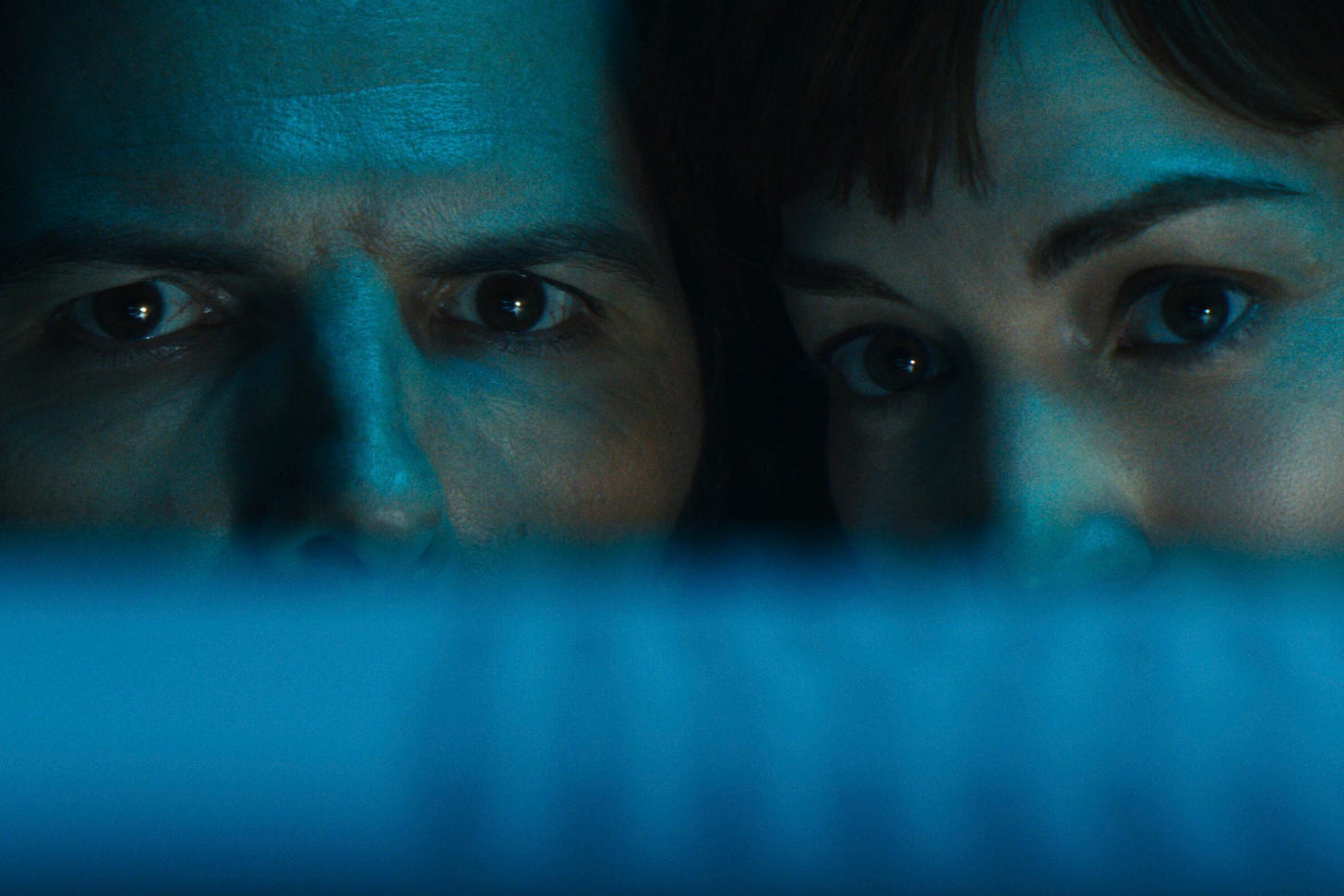
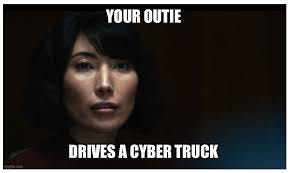
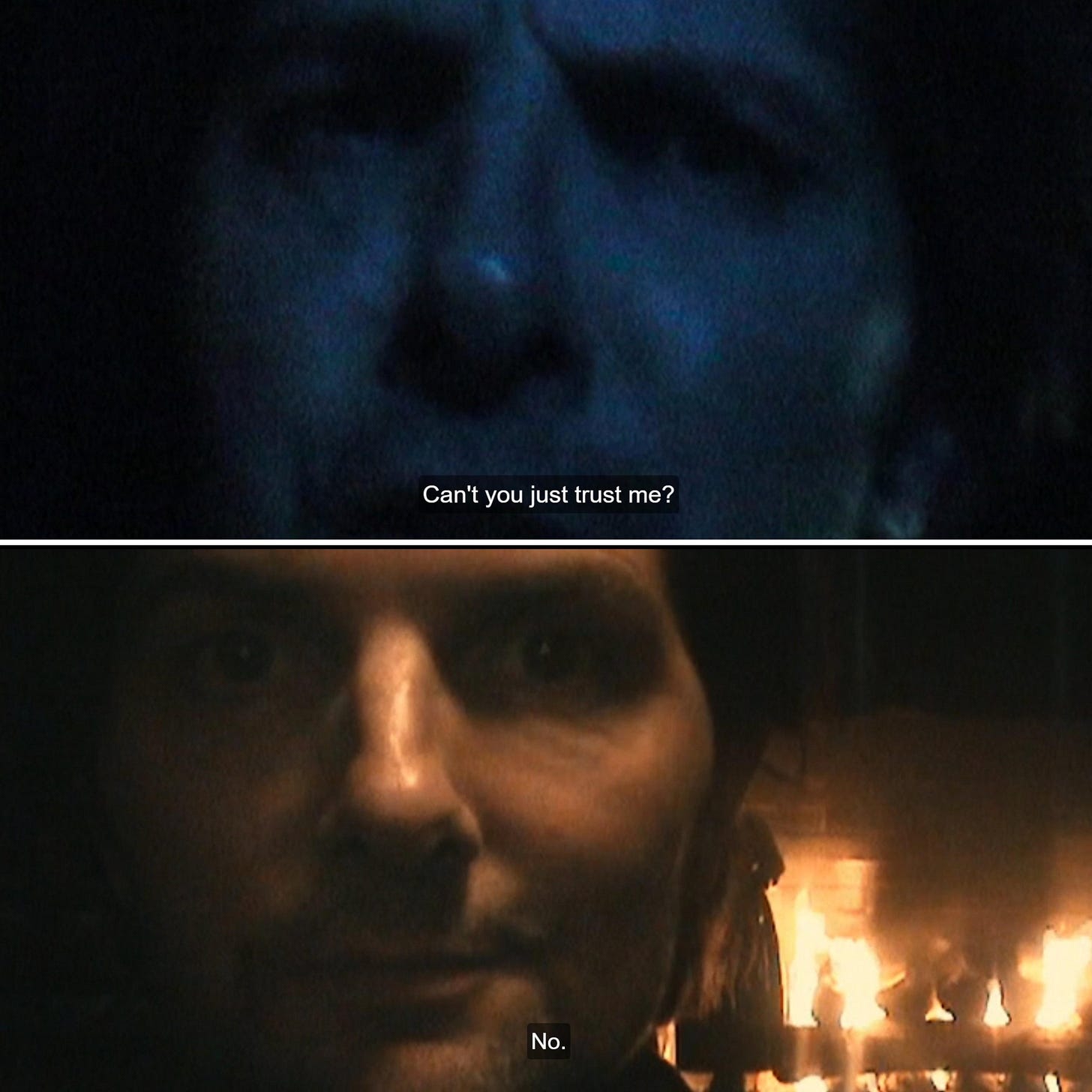
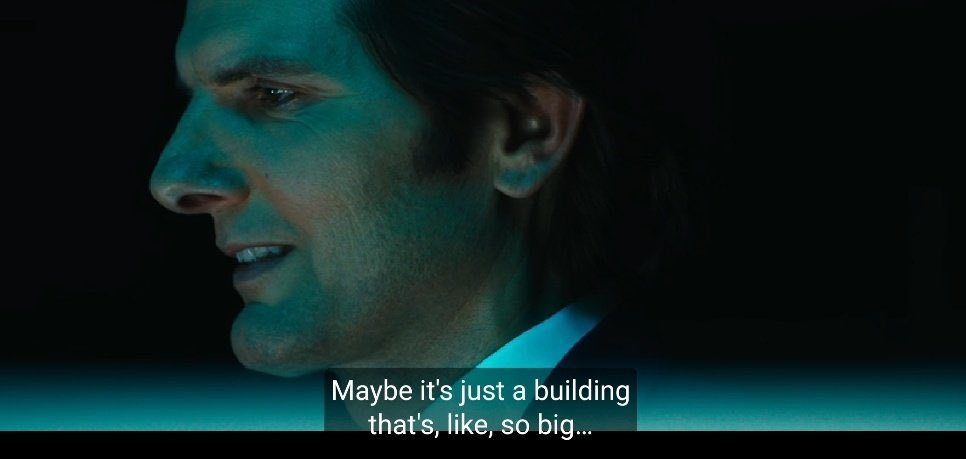
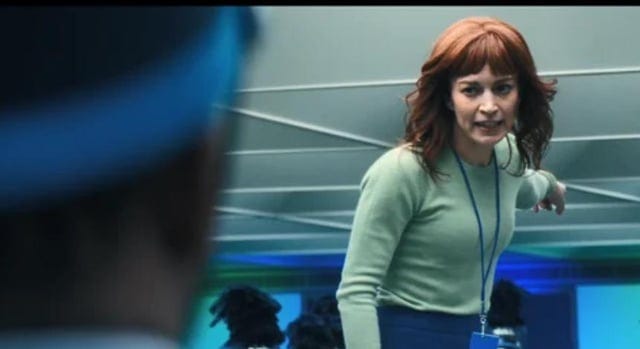
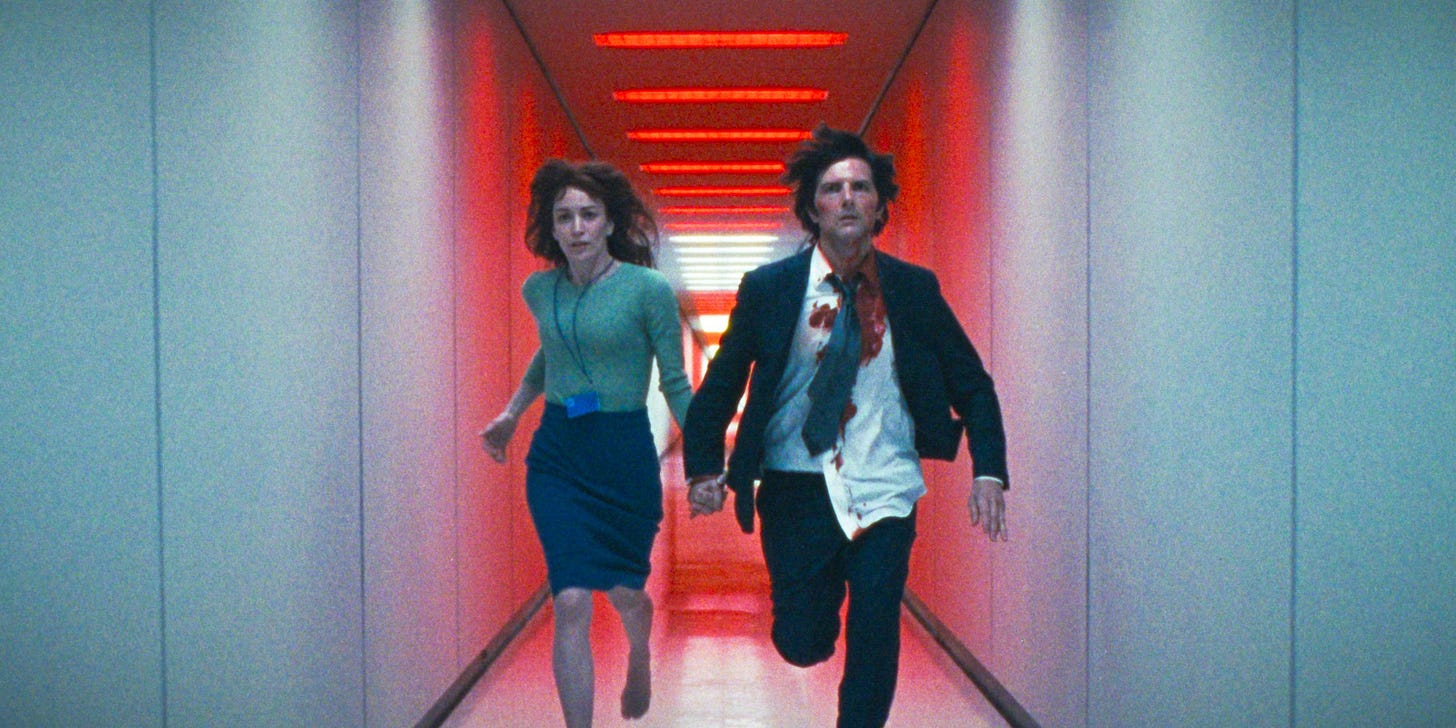
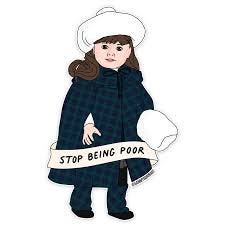
I saved this and saved it knowing it would get me good, but damn brother, this exceeded even my high expectations. A beautiful essay that’s got me crying on this Canadian ferry right now 🖤
I didn't know people were arguing that Mark S. isn't a person. Did they miss the entire show??? It's a great metaphor for parts work too. So often people want parts of themself to go away. I always hear from clients "I don't like this part of myself. I wish I would stop self harming, stop blaming myself, stop..." whatever else one wants to stop. And all i've ever seen is the more we fight with the parts of ourselves that are in pain the stronger and more rooted they become. And when we show these parts kindness, understanding, love even, they can transform into something beautiful. Mark is fighting with Mark S. trying to force him to go away, I would go so far as to say he's ashamed of creating Mark S. it's always easier to disappear that shame than actually face it. Makes you think what would happen if Mark actually listened to Mark S. his wants and needs. Maybe Mark S. would be more cooperative and trusting if he knew the end goal wasn't to disappear him.